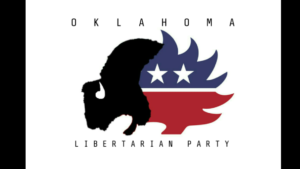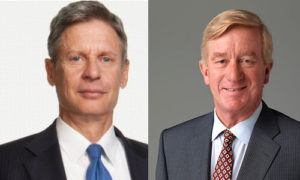Recently, we learned that Oklahoma’s only Governors debate was going to exclude the two Independent candidates for governor, Richard Prawzienski and Kimberly Willis. We reached out to the League of Women Voters and learned that they were not invited because they did not meet the criteria for debate inclusion. At the time, we had reached out to OETA, one of the other sponsors, seeking their comments. They have responded with their comments and the rules for inclusion.
In general, OETA Executive Director Dan Schiedel stated they were not included because they did not meet the guidelines set out in the rules.
At this time, it appears that Mr. Prawdzienski and Ms. Willis do not satisfy the criteria and therefore, neither candidate was invited to the Gubernatorial Debate scheduled for October 2, 2014 at Oklahoma State University in Stillwater.
He has also stated that if the situation changes between now and the debate, they could receive an invitation.
If factors change that allow Mr. Prawdzienski and/or Ms. Willis to satisfy the terms of the OETA Debate Criteria and Participation Policy (and criteria set forth by the debate partners) in advance of October 2 , we will re-evaluate the matter.
But what exactly are the rules regulating who get’s to be included? For that, Mr. Schiedel provided a link to those rules. So let’s take a look. Starting with the opening paragraph introducing the rules, emphasis mine:
OETA-The Oklahoma Network has a long tradition of encouraging statewide coverage of debates and other forums involving governmental leaders and candidates for elected office. We follow all rules and regulations mandated by the Federal Communications Commission. As far as debates and other similar forums (“the debates”), we must be sensitive to the number of participants. Therefore, OETA-The Oklahoma Network (“OETA”) reserves the right, in the public interest, to limit participants and the manner of the production in accordance with this OETA Debate Criteria and Participation Policy.
In this, OETA admits that the rules are designed to limit the number of participants in any debate they sponsor. Why? For the public interest of course. Exactly what that means is probably up to debate itself. One would think that the public interest would be better served by including all candidates for the office featured.
Let’s move on and look at how they determine which candidates are included.
To be considered for inclusion in OETA-produced and broadcast debates, the candidate must satisfy the following criteria:
Must be a legally qualified candidate that is qualified for a place on the ballot;
I don’t think that any reasonable person would think that Richard Prawdzienski or Kimberly Willis fail this requirement. They are both ballot qualified and will be on the ballot. So let’s see what else might be preventing their invitation.
When working with a debate “partner” or other organization integral to the presentation of the debate (“presentation organization”), the candidate must satisfy the criteria of the “partner” or “presentation organization”;
This rule grants any participating debate sponsor to block inclusion of a candidate for any reason. The sponsor doesn’t seem to be required to provide any justification, simply that they don’t want that candidate to appear. Why this is even a rule, is anyone’s guess. With three separate sponsors with their own agendas it would be easy for any one of them to simply say “We don’t want candidate X at the debate” and OETA would simply agree.
Must show at least 5% support in any available legitimate, professionally-conducted public opinion surveys (polls) by an independent political pollster
This next criteria is often the most sticking point for any debate. In this rule, the debate organizers are shifting the burden for exclusion onto a third party they have no control over. If that third party conducting the poll wishes to exclude any candidate, of which we have already shown they are, then the debate organizer can simply wash their hands of any blame. This particular rule is designed for the sole purpose of excluding any candidate that is not a member of the two duopoly parties as most professional pollsters only include duopoly party candidates in their polls.
Must have demonstrated a serious and responsible candidacy by taking certain actions necessary for the undertaking of a statewide or district campaign which shall be evaluated in their totality
Next is a set of rules that may seem objective but are simply a subjective means of determining the validity of any candidate. They are a set of rules that if any single point is not met, the candidate is deemed “not serious” and thus excluded from the debate. So what are these guidelines? There are quite a few, but I will list some of the most interesting ones.
Whether the candidate has organized and implemented a statewide or district-wide fundraising program and can demonstrate raising of campaign contributions of at least $10,000.00 exclusive of funding from the candidate’s own resources
Whether there is a campaign office, outside of the candidate’s home, and a campaign telephone number and e-mail address
Whether the candidate is preparing for or conducting statewide or district-wide media operations
Whether the candidate has been included in campaign coverage of other television news organizations
Whether the candidate has received more than incidental press coverage (e.g. identification as a candidate) in at least five (5) bona fide professional print, online, radio, television or cable television news stories
What is clear in this set of criteria is the continued reliance on third parties to effectively veto the inclusion of any candidates. While the first two I listed seem to be aimed at the work done by the candidate him/herself, The last two simply cede control over the debate roster to parties outside the control of the debate organizers.
If you look at these rules in totality, if a candidate is ballot qualified, raises significant sums of money, attends public events, distributes campaign literature, but is excluded from polls, ignored by the press, or any one of the debate organizers doesn’t like him or her, then they are excluded. In the end, these rules are designed from the onset to exclude Independent and alternative party candidates.
One final note, these rules were initially adopted in September of 2002. In that year, Independent Gary L. Richardson received just over 14% of the vote. Democrat Brad Henry eeked out a victory of less than 1 percentage point. I am merely speculating here but perhaps the strength of the Richardson campaign at the time was one of the primary drivers of this change. In comparison, the Commission for Presidential Debates revamped its rules in the wake of Ross Perot’s successful third party run for President that resulted in a victory for Bill Clinton over George Bush in 1992.
Despite all that and what these rules state, the exclusion of any candidate in a debate or forum for any office is a disservice to the voters of Oklahoma. By denying those candidates a spot at the debate, the organizers are denying the people of Oklahoma a fair, free and equal election.
We would recommend that everyone who reads this to contact OETA Executive Direct Dan Schiedel, the League of Women Voters and Oklahoma State University to demand that all candidates for Governor be invited to the debates regardless of these rules.
 While Donald Trump took all 7 of Oklahoma’s Electoral College votes and the national election, the Libertarian Party of Oklahoma posted a major victory of their own. Gary Johnson, the Libertarian candidate for President, posted a vote return of 5.74% and a total of 83,334 votes in the Oklahoma election. This election return means that the Libertarian Party beat the needed 2.5% of the vote to stay recognized as a political party in Oklahoma. This means that they will not have to petition to be recognized for the 2018 election.
While Donald Trump took all 7 of Oklahoma’s Electoral College votes and the national election, the Libertarian Party of Oklahoma posted a major victory of their own. Gary Johnson, the Libertarian candidate for President, posted a vote return of 5.74% and a total of 83,334 votes in the Oklahoma election. This election return means that the Libertarian Party beat the needed 2.5% of the vote to stay recognized as a political party in Oklahoma. This means that they will not have to petition to be recognized for the 2018 election.
